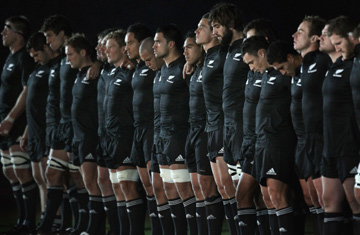
Facing down a challenge New Zealand's All Blacks line up against Scotland in Edinburgh on Nov. 13, 2010. A World Cup win would buoy the rugby-crazy country after February's earthquake
For people who don't think "a good maul" is a contradiction in terms, life's about to get good. Between Sept. 9 and Oct. 23, an anticipated 85,000 traveling rugby enthusiasts and four billion TV viewers will focus their attention on New Zealand as it hosts the sport's seventh World Cup. And while backers of the 20 countries competing in the tournament will be hoping their own team wins, most are approaching the contest wondering, with a mix of dread and awe, whether New Zealand's mighty All Blacks — the sport's sparkling poster boys and dominating force for much of the past three decades —can finally take the crown that has somehow eluded them since they won the World Cup's first edition in 1987.
"Though the All Blacks have been joined by South Africa and more recently Australia as the top teams in world rugby, New Zealand's domination, influence, and iconic status has been so significant over the years that it would be a travesty if it didn't win this Cup after 24 years of having been denied — especially with the country hosting it for the first time since their last world title," says John Nauright, a professor in the Academy of International Sports at George Mason University in Virginia. "Despite the game's English birthplace, rugby has become New Zealand's sport, and their All Blacks have become rugby's global icons. In terms of a world title, New Zealand is simply due."
"New Zealand is a small, edge-of-the-map country that people would ignore if it weren't for the attention and respect it earns abroad from rugby, and our illustrious All Black teams," adds Bob Gregory, a professor of politics at Victoria University of Wellington — and like most of his fellow Kiwis, a former player and ardent rugby fan. "Given the relative domination of New Zealand national teams over the decades, we sort of feel like we're due for another World Cup win. So New Zealanders hope this time the full World Cup and title are coming home."
Of course, the 19 other national teams participating in rugby's showcase event will be looking to wreck New Zealand's plans to house the World Cup's Web Ellis trophy for the next four years. Rivals include traditional powers like England, Ireland, South Africa and Australia; dark horses like Georgia, Japan, and Namibia; fast-rising nations with established rugby pasts (Argentina, Romania, Georgia); and relative neophytes like the U.S., Russia, and Canada. But within that free-for-all for rugby's ultimate prize, another unofficial, amorphous struggle will occur between the two hemispheres, as sides from the north look to break what has been a fairly commanding lock on rugby by southern countries going back 100 years — give or take the odd winning tour, test series, or World Cup upset by European teams. Though most of the time clashes between neighboring countries or historical rivals generate the greatest passion among players and fans, a form of "hemisphere solidarity" is often also felt during World Cup tournaments as nations with roughly common histories, experiences, and perspectives square off with those from the other side of the Equator.
"Matches between South Africa and New Zealand, or Australia against the All Blacks will always be incredibly hard fought because we've all got legitimate claims to being the dominant side in rugby historically, and want to prove that by beating one another decisively in each new match," says Eduard Coetzee, a South African player for French club Biarritz Olympique. "But we're also all somewhat similar to one another in being ex-colonies, former frontier people, and having cultures that cherish rugby as something close to a religion. European Sides — former colonial powers and inventors of the game — used to approach matches confidently, with swagger, but that's not the case anymore. And no one in the south wants to give anyone in the north the luxury of entering a match that way again."
By now, they may have forgotten how. The emergence of southern nations as rugby's formidable actors dates far back into the last century, when distances and the slowness of travel limited international encounters to periodic tours of squads in opposing hemispheres. "The All Blacks that staged the first tour of Britain in 1905 stunned the world by demolishing virtually every team they played, with new configurations, technical and strategic innovations, and with speed and style no one had ever seen," says Nauright, noting that South Africa repeated the exploit in 1906. "While it took Australia longer to join those two nations atop the rugby heap, it was fairly well established even before World War II that the bigger, fitter, faster and wily colonials had gained the upper hand over the Old World."
The creation of the first rugby World Cup event didn't reverse that southern trend. Since 1987, Australia and South Africa have each won a pair of global trophies, with New Zealand and England boasting one apiece. True, European sides have delivered regular pushbacks — and even slap-downs. England's world title came at the expense of 2003 Cup host Australia, and its teams have been finalists twice. France has contested two finals, and sent heavily favored New Zealand squads home in 1999 and 2007 Cups. But Jérôme Thion, a French player who was on the 2007 squad that stunned New Zealand in the quarter-finals, says the general domination of southern teams during international play over the decades is evident — and also rooted in the contrasting size, role, and influence rugby assumes in societies on either Hemisphere.
